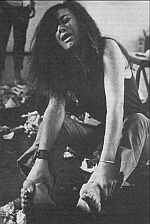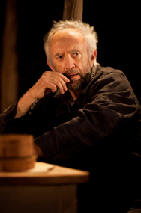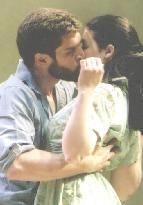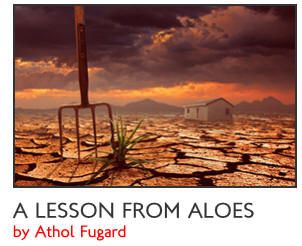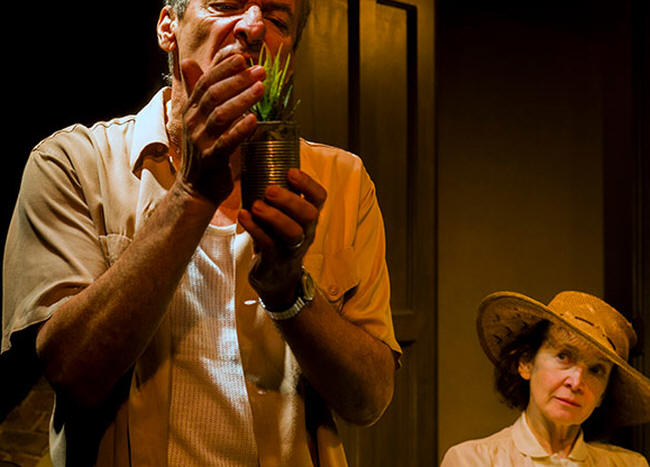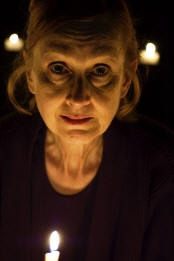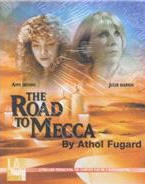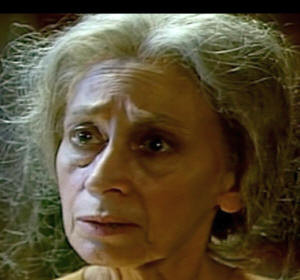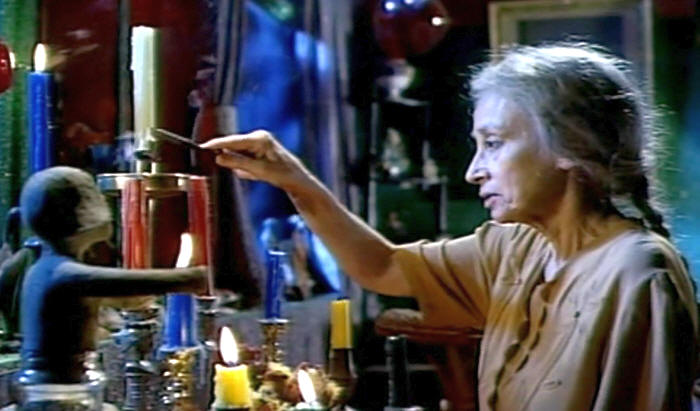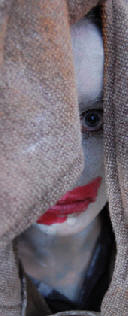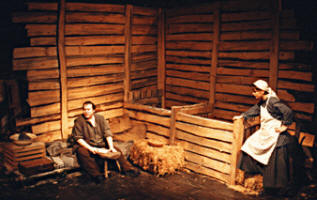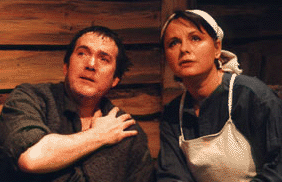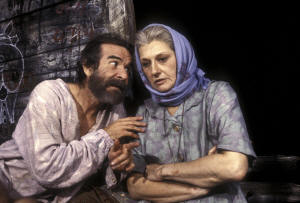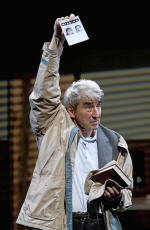|
"Silence
Fugard’s Orestes fuses the Greek tragedy of Clytemnestra with South African violence. "The young man with the suitcase suggests John Harris…he took a suitcase full of dynamite and petrol, wired to a time fuse, into the Johannesburg Railway Station and left it beside a bench. It exploded, killing a young child and severely burning an old woman. He was caught, tried and executed". The play was improvised by Fugard and the actors Yvonne Bryceland, Wilson Dunbar and Val Donald and is mainly mime. Fugard said that for a long time he wanted to try and make a valid theatrical experience using methods other than completed script, set rehearsal period, performance deadline, etc. etc. and he was given the chance. Fugard does not provide a script of Orestes but instead describes it in "A letter to an American Friend". The premiere was directed by Fugard in Cape Town with Yvonne Brycleland, Wilson Dunster and Val Donald. Photo of Yvonne Bryceland in Orestes from Stephen Gray´s Athol Fugard
"It was built a long
time ago by two slaves and it took them their entire
lifetimes...that wall isn't made of stone. Fear. That's
why it's still there. A monument to man's capacity to stand still"
A horse has fallen down a well and a girl is lowered on ropes to rescue it. Fugard´s play uses a bare stage and a bench to portray the scene, as this Greek drama begins. And slowly Dimetos falls into the trap of the forbidden passion for the girl, his niece. Written as a commission for the Edinburgh Festival in 1975. Carel Trichard played Dimetos and Yvonne Bryceland played Sophia. In the London version in 1976 Paul Scofield played Dimetos. Fugard directed. Fugard´s Dimetos does not come from Greek mythology, but from the Notebooks of Albert Camus. The Drummer 1980 A very short one-man acting/improvisation piece with no dialogue. It was commissioned for the Kentucky Festival of New American Plays and performed by Dierk Toporzysek in 1980. A tramp roots through rubbish finds a drumstick, then a second. He can make a rhythm with the sticks, and then with an upturned tin can he has all he needs to rise above the sounds of the city. He walks towards the city with his drumsticks ready. A Beckett-like piece but missing Beckett’s ability to disorientate the audience and sharpen their perceptions. Instead, Fugard’s piece has the danger in performance of becoming sentimental. Fugard explains the piece was based on a tramp he saw in New York who was "very joyous… defiantly so!…and seemed to have a sense of himself As being extravagantly free". There was an ambitious attempt made to produce The Drummer on radio.
First performed in 1978 the play was written in the 1960s. Fugard directed the premiere in Johannesburg. He would later direct Zakes Mokae and James Earl Jones in the play. The play seems to start off as a domestic drama with husband and wife Piet and Gladys expecting visitors. We learn Piet´s life was changed when he joined a political demonstration, but now he is suspected of being a police informer. The visitor Steve is an activist but he is giving up his politics to go into exile. They meet to say goodbye. But Gladys has her own torments "I've discovered hell for myself. It might be hard for you to accept Steven, but you are not the only one who has been hurt. Politics and black skins don't make the only victims in this country". Fugard told actors "Piet and Steve are victims of a system they have tried to resist, something man-made, whereas Gladys is God's victim" (from Bare Stage). Fugard says "Aloes [a type of plant] are distinguished above all else for their inordinate capacity for survival in the harshest of possible environments". The photo is from the Finborough Production 2019 directed by Janet Sizman with Dawid Minnaar and Janine Ulfane (Gladys) shown. The image is from here. "everything else has all but been damned out of existence. It's obvious where you Afrikaners get your ideas of God from... as merciless as the religion they preach around here."
An eccentric sculptress has created her own Mecca. But other people want her to conform. A powerful three actor play by Fugard. Fugard says "My hidden agenda in writing that play was an attempt to understand the genius, nature and consequences of a creative energy...The Miss Helen...is actually a self portrait. It was only after I had written the play that I realised what I had been trying to do". Fugard directs the premiere in Yale, USA. He would later direct Yvonne Bryceland as Miss Helen and himself as Marius. The play is based on sculptress, Helen Martin who lived in Nieu Bethesda, where Fugard lives. He saw but never met her.
The top photo is from loper.co. Click on the image for more excellent photos. The first act of the play is too wordy, and unwisely a character says "coming here is like stepping into the middle of a Chekhov play". It gets a laugh, but whereas Chekhov can use seemingly casual conversation to convey deeper truths, Fugard resorts to characters telling too many anecdotes about other people (the coloured woman and baby, the schoolteacher). And the dialogue does clog, with a Camus quote also being brought in. But in perfect stagecraft the third character, Marius, appears as the first act ends. This changes the dynamics and in the interval people wonder how he will changes things.
And the second act has some of Fugard's best writing as the three characters are opened up more. Marius is revealed to be well-meaning (Fugard subtly avoids a cliché of the harsh dominating character we expect), but Marius cannot see beyond his own beliefs and misses an opportunity for true happiness.
A Place with the pigs: a personal parable 1987
"Every day of my
self-imposed banishment from the human race" Another rare play set outside South Africa. A Russian deserter hides for decades with the pigs. His only relief is a midnight walk disguised as a woman. Fugard says the play was a metaphor for his own alcoholism. But the play spells out every message and the despair is unremitting: a butterfly enters the pig-prison, but this symbol of freedom is eaten by a pig. Even the midnight walk seems weak with the main character (played in the premiere by Fugard) in drag. It can be staged with puppets for pigs (and butterflies) or using mime. The premiere was at Yale in USA with Fugard directing and starring. The play was badly received by critics. Fugard says "I know [it] is a very good play, possibly one of my best, and will one day confound the critics who did not think so. But it was not seemingly about South Africa and that was enormously disconcerting both to the critics and the audiences".
Athol Fugard and Suzanne
Shepherd in the 1987 world premiere. Have You Seen Us 2009
Fugard's play set in the USA where Fugard was living at the time. The play tackles anti-semitism, with Classics professor Henry Parsons and Mexican waitress Adela. "an alcoholic academic who finds himself stuck in a Southern California sandwich shop on Christmas Eve. With him are a waitress- 'an overweight, uneducated Mexican waitress,' as Henry puts it, with whom he's accustomed to playing an 'ugly little game ... of trading insults and offensive gibes' - and an old Jewish couple. It's in their company, on that night, that he finally comes to terms with hard truths about himself". Fuggard says it's "not so much language on the page as what happens to language in people's mouths. How we speak. How we corrupt it. How we use it to hide away secrets. How we use it sometimes to try and tell our biggest secrets". The premiereat the Long Wharf Theatre was poorly received. Quotes from Diane Orson, NPR, 7 Dec 2009, click here. |
